civilization

Who are the “magicians of the gods,” in Graham Hancock’s alternative history series Ancient Apocalype on Netflix, and where did they come from? Professor of geology, Marc Defant, applies critical thinking to Hancock’s historical and literary research to identify the erroneous conclusions in both his series and in his many books, which have been highly influential in presenting Hancock’s alternative theory of history to those less prepared to evaluate the evidence (or lack thereof).
One of the surprise bestselling books of 2022 is David Graeber’s and David Wengrow’s book The Dawn of Everything: A New History of Humanity, in which they attempt to upend the standard and widely accepted model of how Hunter-Gatherer bands and tribes developed into chiefdoms and states. How accurate is their alternative history of humanity? In this review essay, Chris Edwards considers the evidence as presented in this compelling book.
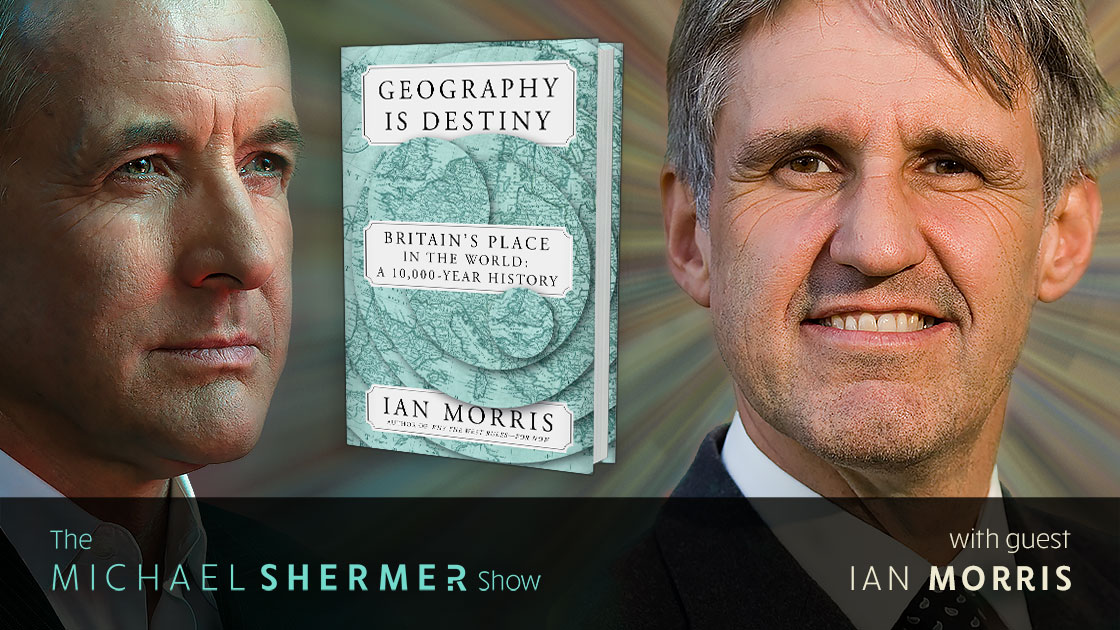
In this conversation on deep time and big history, Shermer and Morris discuss the history of Big History, the future of energy and civilization, China and the future of energy and political power, what Britain was like 8000 years ago, the major transitions in British history, counterfactual history, slavery and the abolition of the slave trade, the role of ideas in history (civil rights, rule of law, justice, etc.), reparations and making right the wrongs of the past.
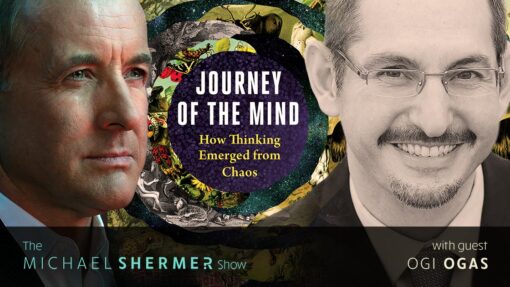
Michael Shermer speaks with computational neuroscientist, Ogi Ogas, about his unified account of the mind that explains how consciousness, language, self-awareness, and civilization arose incrementally out of chaos, and how leading cities and nation-states are developing “superminds,” and perhaps planting the seeds for even higher forms of consciousness.
Michael Shermer speaks with computational neuroscientist, Ogi Ogas, about his unified account of the mind that explains how consciousness, language, self-awareness, and civilization arose incrementally out of chaos, and how leading cities and nation-states are developing “superminds,” and perhaps planting the seeds for even higher forms of consciousness.
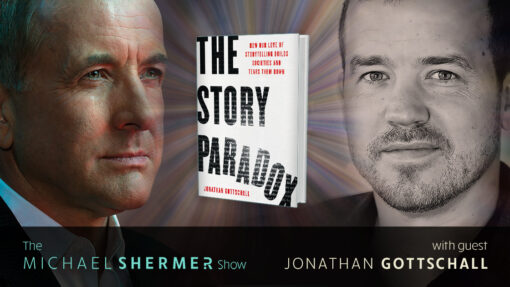
“How can we save the world from stories?” Michael Shermer speaks with Jonathan Gottschall about The Story Paradox: How Our Love of Storytelling Builds Societies and Tears Them Down. Gottschall reveals why our biggest asset has become our greatest threat, and what, if anything, can be done.
“How can we save the world from stories?” Michael Shermer speaks with Jonathan Gottschall about The Story Paradox: How Our Love of Storytelling Builds Societies and Tears Them Down. Gottschall reveals why our biggest asset has become our greatest threat, and what, if anything, can be done.
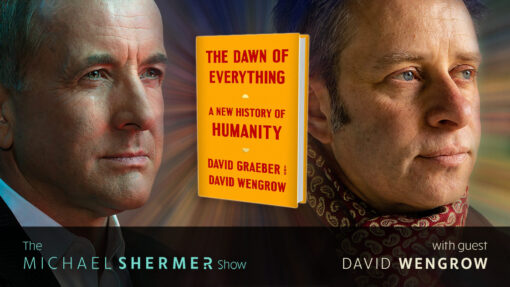
In this conversation, based on the book The Dawn of Everything: A New History of Humanity, Michael Shermer speaks with professor of comparative archaeology, David Wengrow, about his pathbreaking research in archaeology and anthropology that fundamentally transforms our understanding of the human past and offers a path toward imagining new forms of freedom, new ways of organizing society.
In this conversation, based on the book The Dawn of Everything: A New History of Humanity, Michael Shermer speaks with professor of comparative archaeology, David Wengrow, about his pathbreaking research in archaeology and anthropology that fundamentally transforms our understanding of the human past and offers a path toward imagining new forms of freedom, new ways of organizing society.

In episode 236, Michael Shermer speaks with Fernanda Pirie on The Rule of Laws: A 4,000-Year Quest to Order the World — from ancient Mesopotamia to today, the epic story of how humans have used laws to forge civilizations.
In episode 236, Michael Shermer speaks with Fernanda Pirie on The Rule of Laws: A 4,000-Year Quest to Order the World — from ancient Mesopotamia to today, the epic story of how humans have used laws to forge civilizations.

In Science Salon # 122 Michael Shermer speaks with Walter Scheidel as he recounts the gripping story of how the end of the Roman Empire was the beginning of the modern world.
In his lecture on Pathways to Evil (Part 2), Dr. Michael Shermer fleshes out the themes of Part 1 by exploring how the dials controlling our inner demons and better angels can be dialed up or down depending on circumstances and conditions. Are we all good apples but occasionally bad barrels turn good apples rotten, or do we all harbor the capacity to turn bad?
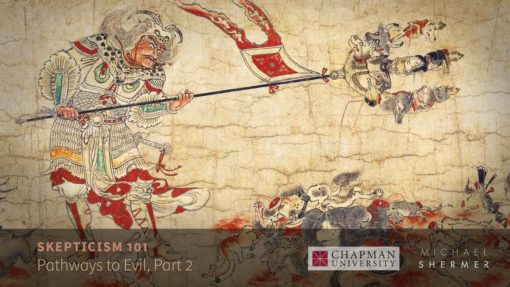
In his lecture on Pathways to Evil (Part 2), Dr. Michael Shermer fleshes out the themes of Part 1 by exploring how the dials controlling our inner demons and better angels can be dialed up or down depending on circumstances and conditions. Are we all good apples but occasionally bad barrels turn good apples rotten, or do we all harbor the capacity to turn bad?
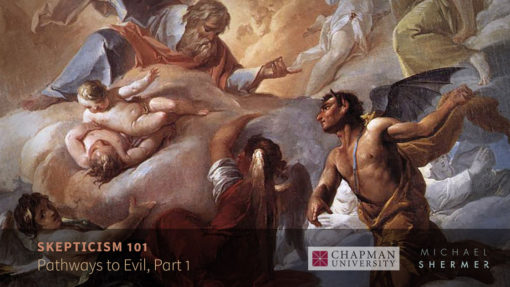
In his Skepticism 101 lecture on Pathways to Evil (Part 1), Dr. Michael Shermer considers the nature of evil in his attempt to answer the question of how you can get normal civilized, educated, and intelligent people to commit murder and even genocide.
In his lecture on Pathways to Evil (Part 1), Dr. Michael Shermer considers the nature of evil in his attempt to answer the question of how you can get normal civilized, educated, and intelligent people to commit murder and even genocide. PLUS, this weekend only, Skeptic magazine back issues (in print or digital formats) are on sale for only 99 cents each!
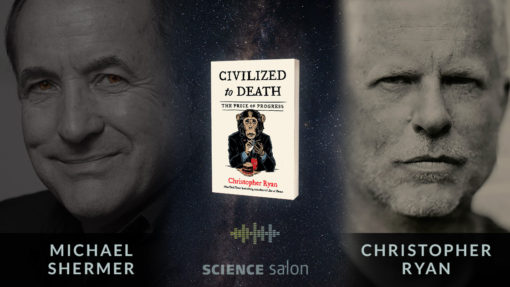
Most of us have instinctive evidence the world is ending — balmy December days, face-to-face conversation replaced with heads-to-screens zomboidism, a world at constant war, a political system in disarray. We hear some myths and lies so frequently that they feel like truths. You’re lucky to be alive here and now. Well, maybe… Civilized to Death counters the idea that progress is inherently good, arguing that the “progress” defining our age is analogous to an advancing disease.
In Science Salon # 102 Michael Shermer speaks with Christopher Ryan about his new book: Civilized to Death: The Price of Progress. PLUS, The recent spate of drone sightings in the Midwest have residents on edge. Medical sociologist Robert Bartholomew avers that one explanation can be ruled out — mass hysteria.


















